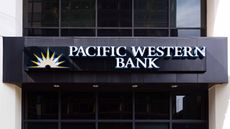Stock Market Today: Big Bank Earnings Fail to Lift Stocks
The major indexes closed lower Friday on hawkish Fed speak and dismal retail sales data.
- (opens in new tab)
- (opens in new tab)
- (opens in new tab)
- Newsletter sign up Newsletter


Stocks started the day modestly higher after several big banks, including JPMorgan Chase (JPM (opens in new tab)) and Citigroup (C (opens in new tab)), kicked off first-quarter earnings season on a high note. However, the major indexes quickly turned lower after one Fed official suggested the central bank has more work to do to bring down inflation.
The selling pressure continued throughout the session, though all three main benchmarks managed to hang on to weekly gains.
JPMorgan and Citigroup were among a handful of big banks that reported Q1 earnings this morning. The financial sector, while always important, is even more so right now following last month's failure of several regional banks.

Sign up for Kiplinger’s Free E-Newsletters
Profit and prosper with the best of expert advice on investing, taxes, retirement, personal finance and more - straight to your e-mail.
Profit and prosper with the best of expert advice - straight to your e-mail.
But the turmoil didn't seem to impact JPM, which saw first-quarter earnings surge 56% year-over-year to $4.10 per share and revenue jump 25% to a record $38.4 billion. Net interest income – a key metric for banks that measures what they make on loans minus what they pay depositors – was up 49%. Citigroup, for its part, reported steady top- and bottom-line growth for the quarter as higher interest rates fueled an 18% year-over-year jump in personal banking revenue. JPM stock spiked 7.5% today, while C added 4.8%.
"Big banks are largely immune to the issues that drove Silicon Valley Bank and Signature Bank into the columbarium of failed financial institutions," says José Torres, senior economist at Interactive Brokers. "Unlike regional banks [which appear on next week's earnings calendar], the money centers have low costs of funds, especially with the recent failures of smaller banks causing investors to flock to the safety of the biggest financial companies."
Wall Street's positive mood quickly soured after Federal Reserve Governor Christopher Waller said during a speech in San Antonio, Texas, that the central bank must keep raising rates because of stubbornly high inflation and a tight labor market.
Still, signs continue to show that the Fed's efforts to rein in inflation by slowing the economy are indeed working. The Commerce Department earlier said retail sales (opens in new tab) in March slumped 1% month-over-month, the biggest decline since November, due largely to falling gas prices and auto sales.
Also on the economic front, preliminary data from the University of Michigan (opens in new tab) showed that while consumer sentiment is up from March (to 63.5 from 62.0), near-term inflation expectations are also on the rise (to 4.6% from 3.6% last month). Longer term inflation expectations remain steady, though.
At the close, the Nasdaq Composite was down 0.4% at 12,123, the S&P 500 was off 0.2% at 4,137, and the Dow Jones Industrial Average was 0.4% lower at 33,886.
Earnings, Tax Day on deck
With the Fed meeting still a couple weeks out and a relatively light economic calendar on tap, all eyes will be on corporate earnings next week. But there's another important event investors should be aware of: Tax Day. While the official deadline to file taxes is Tuesday, April 18, some folks, including taxpayers impacted by severe storms, have extra time. If you need a tax extension, make sure to check out Kiplinger's guidance on how to get more time to file your federal tax return.
Investors will also want to review this year's capital gains tax rates, which apply to profits made from the sale of stocks, mutual funds and other assets. If you're looking for ways to reduce investment taxes, these five strategies could help.

With over a decade of experience writing about the stock market, Karee Venema is an investing editor and options expert at Kiplinger.com. She joined the publication in April 2021 after 10 years of working as an investing writer and columnist at Schaeffer's Investment Research. In her previous role, Karee focused primarily on options trading, as well as technical, fundamental and sentiment analysis.
-
-
 Consumers Won't Cut Mobile, Internet Spending, Despite Inflation: Kiplinger Economic Forecasts
Consumers Won't Cut Mobile, Internet Spending, Despite Inflation: Kiplinger Economic ForecastsEconomic Forecasts Consumers Won't Cut Back on Mobile or Internet Spending, Despite Inflation: Kiplinger Economic Forecasts
By John Miley • Published
-
 Courts to Rule on Agency Powers: Kiplinger Economic Forecasts
Courts to Rule on Agency Powers: Kiplinger Economic ForecastsEconomic Forecasts The scope of agency power is under the spotlight in cases in the Supreme and Federal Courts: Kiplinger Economic Forecasts
By Letter Editors • Published
-
 Stock Market Today: Stocks Slip as Consumer Sentiment Slides
Stock Market Today: Stocks Slip as Consumer Sentiment SlidesConcerns about the debt ceiling also weighed on stocks Friday.
By Karee Venema • Published
-
 Stock Market Today: Disney Earnings Drag on Dow
Stock Market Today: Disney Earnings Drag on DowAn unexpected decline in subscribers weighed on Disney stock Thursday, while notable deposit outflows sent PacWest tumbling.
By Karee Venema • Published
-
 Stock Market Today: Stocks Lose Steam After CPI Report
Stock Market Today: Stocks Lose Steam After CPI ReportStocks wavered after the April CPI report supported the case for the Fed to stop raising rates – but not cut them.
By Dan Burrows • Published
-
 Stock Market Today: Stocks Churn Ahead of April CPI Report
Stock Market Today: Stocks Churn Ahead of April CPI ReportThe major market indexes made modest moves Tuesday as investors awaited debt-ceiling updates and inflation data.
By Karee Venema • Published
-
 Stock Market Today: Stocks Choppy With Inflation Data on Deck
Stock Market Today: Stocks Choppy With Inflation Data on DeckThe major indexes struggled for direction Monday amid more volatility in regional bank stocks and ahead of this week's key inflation updates.
By Karee Venema • Published
-
 Warren Buffett's Berkshire Hathaway Stock Is Taking Off
Warren Buffett's Berkshire Hathaway Stock Is Taking OffBerkshire Hathaway stock has been clobbering the broader market since the banking crisis set in.
By Dan Burrows • Published
-
 Stock Market Today: Apple Earnings, Bank Stocks Spark Relief Rally
Stock Market Today: Apple Earnings, Bank Stocks Spark Relief RallyThe April jobs report creates uncertainty around the Fed's future policy plans, but it didn't stop the major indexes from soaring Friday.
By Karee Venema • Published
-
 Stock Market Today: Stocks Slide as Regional Bank Rout Worsens
Stock Market Today: Stocks Slide as Regional Bank Rout WorsensThe major market indexes closed lower Thursday as chaos in the banking industry continued.
By Karee Venema • Published









